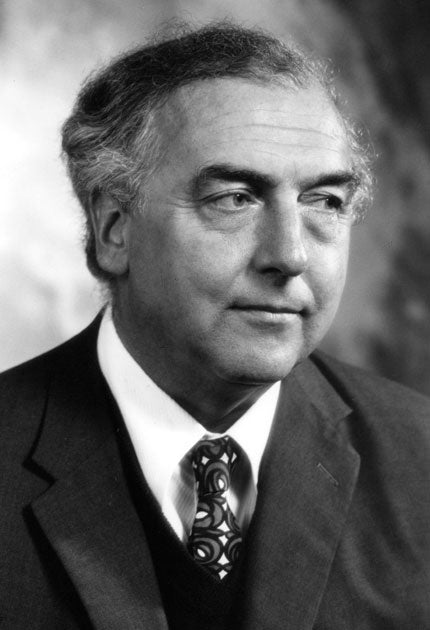Professor Murdoch Mitchison: Biologist who established himself as the foremost authority on the cell cycle in yeast

For a quarter of a century, from 1963 until 1988, Murdoch Mitchison was Professor of Zoology at the University of Edinburgh. According to his predecessor, Michael Swann, he was "the scientist who knows more about the cell cycle in yeast than any other person in the world". A pioneer in cellular biology, he studied the mechanisms of growth and thecell cycle.
John Murdoch Mitchison was born into the intellectual and scientific purple. His father, GR "Dick" Mitchison, QC and MP for Kettering, was my parliamentary colleague from 1962 until 1964, when he went (against his will) to the Lords. Scion of a long line of Mitchison intellectuals, I remember him sitting in the library of the House, day after day, helping his younger colleagues. He was disappointed when Harold Wilson broke an understanding and did not make him Minister of Science in 1964.
Murdoch Mitchison's maternal grandfather was the physiologist Dr John Scott Haldane, Fellow of New College, Oxford and Founder of the Journal of Hygiene. Murdoch's cousin – and close to the family – was Richard Burden Haldane, Viscount Haldane of Cloan, Secretary of State for War from 1905-12, who drove through the Army Reforms which were to save us in 1914. His mother was the writer, Naomi Mitchison, a huge literary persona, while her brother, Murdoch's uncle, was the world famous and controversial geneticist and Marxist JBS Haldane.
As an MP of only a few weeks, in 1962, I was invited to dinner in the Strangers' Dining Room by Dick Mitchison to meet his brother-in-law. Conversation focused on science in India, where Haldane worked in the evening of his life, and where he became an icon. Murdoch, who was present, told me that his uncle imbued him with an enthusiasm for science in Asia, which culminated 20 years later in 1982 in his delight at being chosen as the Royal Society's Exchange Visitor to China for the year.
Murdoch Mitchison was born in Oxford, one of five children – his older brother Denis became a Professor of Bacetriology in London while his younger brother Avrion is a distinguished immunologist who, after he had shown a group of MPs round MRC Mill Hill in his bedroom slippers, was described to us by his Director, Sir Peter Medawar, the Nobel Prize Winner, as the scientist whose work was most likely to lead to palliatives for rheumatism.
The Mitchison women were formidable. Murdoch's sister Lois was the first European to visit China, before the Cultural Revolution, and write about Mao Tse Tung's collective farms. His older sister Val married Mark Arnold Foster, one of the most influential journalists of the day. His wife was the eldest of three Miss Wrongs (the youngest of whom married Peter Shore MP), the daughter of a distinguished Oxford Professor and a distinguished social historian in her own right, the acknowledged expert in the Poor Laws. She was the tutor-supervisor of Gordon Brown when he read History at Edinburgh University.
With a scholarship for Winchester, where he was taught chemistry by Eric James, the late Lord James of Rusholme, first Vice-Chancellor of York, Murdoch arrived at Trinity College, Cambridge in 1939, and worked "fiendishly hard", as he said, to gain 1st class Honours in Zoology Part I and Part II. One of his Directors of Studies was Dr ED Adrian, Nobel Prize Winner and later Master of Trinity. Mitchison acknowledged that no man could have had more distinguished teachers at each stage of his life. Ruefully, Mitchison recalled how Dr Adrian had gently cautioned him, "Your uncle is the rudest man in England – bite your tongue from time to time."
Alas, Murdoch's friends, who were innumerable, might think that Adrian's warning was not always heeded. As one of my colleagues on the Edinburgh University Council on the Biological Sciences put it to me, "Mitchisons are an acquired taste!"
In 1941, aged 19, Mitchison was called up and posted to Army Operational Research, finishing in 1946 as a Major. Mitchison maintained that his army experience proved invaluable when he became Dean of the Science Faculty in charge of the huge concentration of resources at King's Buildings in the University of Edinburgh.
On demobilisation, he became a Research Scholar at Trinity, and was awarded a Research Fellowship (1950-54). In 1953, Edinburgh science was an exciting milieu, and a vastly truncated list of his dozens of publications give a pointer to his work: "Birefringence in Amoebae", "The Mechanical Properties of the Cell Surface", "The status of haemoglobin in sickle-cell anaemia", "The mechanism of cleavage in animal cells", "Differentation in the Cell Cycle".
Besides being President of the British Society for Cell Biology from 1964-72, Mitchison was a hugely significant member of two important bodies, the Royal Commission on Environmental Pollution (1974-79) and the Working Group on Biological Manpower (1968-71).
My abiding memory is going for a number of "structured walks" inthe 1980s and '90s with Murdoch and Rowy – she was never "Rosalind" – in the hills near their home at Pencaitland in East Lothian, and returning to their fireside for an organised evening meal. My wife and I marvelled at their undimmed curiosity about the natural world, politics, and all human behaviour.
His brother Avrion, like Murdoch a fellow of the Royal Society, told me that no man ever had a better brother, and he admired Murdoch because right up to the end he was working on a description of the Italian campaign in the Second World War.
John Murdoch Mitchison, cell biologist: born Oxford 11 June 1922; Research Fellow, Trinity College, Cambridge 1950-54; Lecturer 1953, Professor of Zoology 1963-88 University of Edinburgh; Member, Royal Commission on Environmental Pollution 1974-88; married 1947 Rosalind Wrong (died 2002; one son, three daughters); died 17 March 2011.
Join our commenting forum
Join thought-provoking conversations, follow other Independent readers and see their replies
Comments
Bookmark popover
Removed from bookmarks